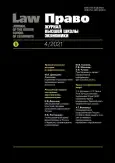Public Contract in the System of Labour Relations in Modern Russia
- Авторлар: Demidov N.1,2
-
Мекемелер:
- National Research Tomsk State University
- Tomsk State University of Government Systems and Radioelectronics
- Шығарылым: Том 14, № 4 (2021)
- Беттер: 25-48
- Бөлім: Russian Law: Condition, Perspectives, Commentaries
- URL: https://journal-vniispk.ru/2072-8166/article/view/318125
- DOI: https://doi.org/10.17323/2072-8166.2021.4.25.48
- ID: 318125
Дәйексөз келтіру
Толық мәтін
Аннотация
Авторлар туралы
Nikolai Demidov
National Research Tomsk State University; Tomsk State University of Government Systems and Radioelectronics
Email: noreply@hse.ru
ORCID iD: 0000-0002-6716-8591
Candidate of Sciences (Law), Associate Professor
Әдебиет тізімі
- Baranov P.P. (2015) Positivist legal thinking in legal science, practice and everyday life in modern Russia. Rossiyskiy zhurnal pravovykh issledovaniy = Russian Journal of Legal Studies, no. 4, pp. 7-14. (In Russ.).
- Bizyukov P. (2011) Individual labor conflicts: can workers protect their rights alone. Moscow: Center for Social and Labor Rights, 124 p. (In Russ.).
- Bizyukov P.V. (2016) Dynamics of labor protests in Russia in 2008-2016. Part 1. Kadrovik=Personnel Officer, no. 11, pp. 66-76. (In Russ.).
- Bogdanova T. (2016) Money has not been seen for a long time... Argumenty i facty = Arguments and Facts, no. 14, pp. 10-11. (In Russ.).
- Bozhkova A.O., Palekha R.R. (2021) Constitution of the Russian Federation as a social contract of modern Russian society and state. Vestnik Voronezhskogo Instituta vysokyh tecknologiy = Herald of Voronezh Institute of High Technologies, no. 1, pp. 164-168. (In Russ.).
- Buchanan J.M. (1997) Works. In: Nobel Laureates in Economics. Vol. 1. Moscow: Taurus Alpha, 560 p. (In Russ.).
- Byvsheva M.V. (2013) Continuity in the education system on the terms of a social contract. Problemy i perspektivy razvitiya obrazovania v Rossii=Russian Education: Issues and Prospects of Development, no. 18, pp. 27-31. (In Russ.).
- Dagaev G.V., Pomulev A.A. (2020) The relationship between the Laffer effect and the shadow economy. Tenevaya ekonomika = Shadow Economy, no. 4, pp. 225-234. (In Russ.).
- Damie V.V. (2004) Atomization of society and social self-organization: Russian context. In: Workers in Russia: historical experience and current situation. Moscow: URSS, pp. 73-82. (In Russ.).
- Deeva N.V. (2015) Social contract and modern education in Russia. Austrian journal of humanitarian and social sciences, no. 5-6, pp. 91-93. (In Russ.).
- Grudtsyna L.Yu., Lagutkin A.V. (2016) The idea of a “social contract” as the basis for a dialogue between the state and civil society. Gosudarstvo i pravo=State and Law, no. 2, pp. 94-98. (In Russ.).
- Hobbes T. (2001) Leviathan. Moscow: Mysl, 478 p. (In Russ.).
- Hume D. (1996) Works. Vol. 1. Moscow: Mysl, 733 p. (In Russ.).
- Lebedev V.M. (2014) Entropy of labor law. In: Legal issues of strengthening Russian statehood. Collection of essays. Tomsk: University, pp. 72-75. (In Russ.).
- Locke D. (1988) Works. Vol. 3. Moscow: Mysl‘, 668 p. (In Russ.).
- Maslyukova E.V., Zaitseva Yu.Yu. (2017) Employment in the informal sector: quantitative methods of analysis. Ekonomika truda = Economics of Labor, no. 4, pp. 423430. (In Russ.).
- Meshcheryakova N.N. (2014) Anomia in a complex society. Vestnik Universiteta MGIMO = Herald of MGIMO University, no. 2, pp. 201-207. (In Russ.).
- Pakhomova E.A. (2015) Consumer paternalism as part of a social contract in Russia. Philosofia prava=Philosophy of Law, no. 3, pp. 71-75. (In Russ.).
- Pazhitnov K.A. (1908) The position of the working class in Russia. Saint Petersburg: Obschestvennaya polza, 306 p. (In Russ.).
- Rawls J. (1995) Theory of justice. Novosibirsk: University, 532 p. (In Russ.).
- Rousseau J.J. (1998) On the social contract. Treatises. Moscow: Kanon-press, 416 p. (In Russ.)
- Ryabushkin N.N., Kapelyuk S.D. (2020) Working poor in Russia: assessing the scale of issue. Ekonomika truda=Economics of Labor, no. 6, pp. 489-498. (In Russ.)
- Sokolov B.O. (2014) The concept of social contract in modern political theory. Candidate of Political Sciences Summary. Saint Petersburg, 25 p. (In Russ.).
- Starkov A.I. (2000) Charter, a social contract between doctors and society. Dnevnik Altaiskoy shkoly politicheskih issledovaniy=Diary of Altay School of Political Studies, no. 8, pp. 21-22. (In Russ.).
- Tsitulsky V.F. (2014) Formation and development of social partnership in the field of work in Russia in the 18th-early 19th centuries (historical and legal study). Doctor of Juridical Sciences Summary. Moscow, 41 p.
- Volchik V.V., Posukhova O.Yu. (2016) Precaria and professional identity in the context of institutional changes. Terra Economicus, no. 2, pp. 159-173. (In Russ.).
- Voltaire F.M. (1988) Philosophical writings. Moscow: Nauka, 751 p. (In Russ.).
Қосымша файлдар








